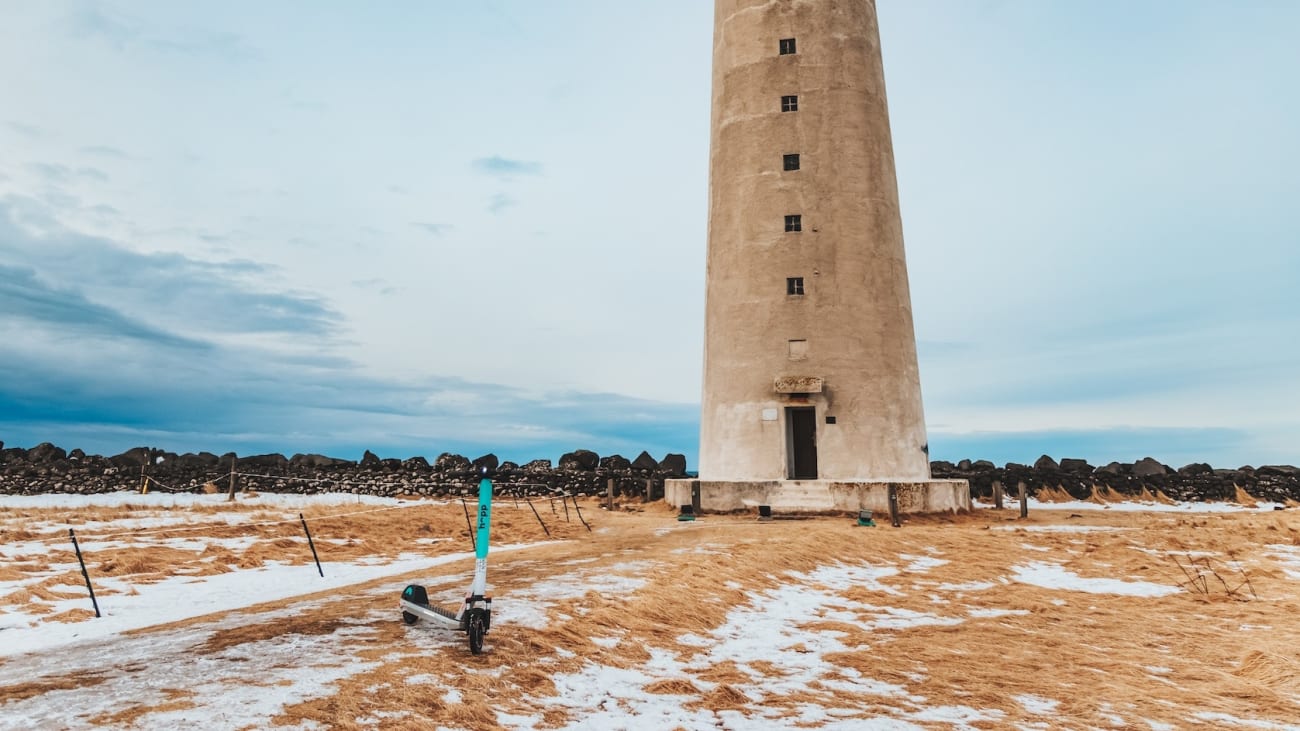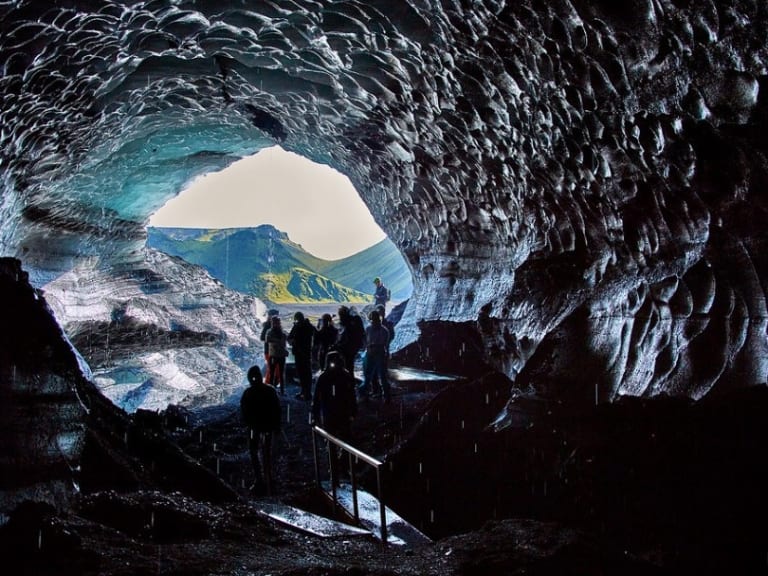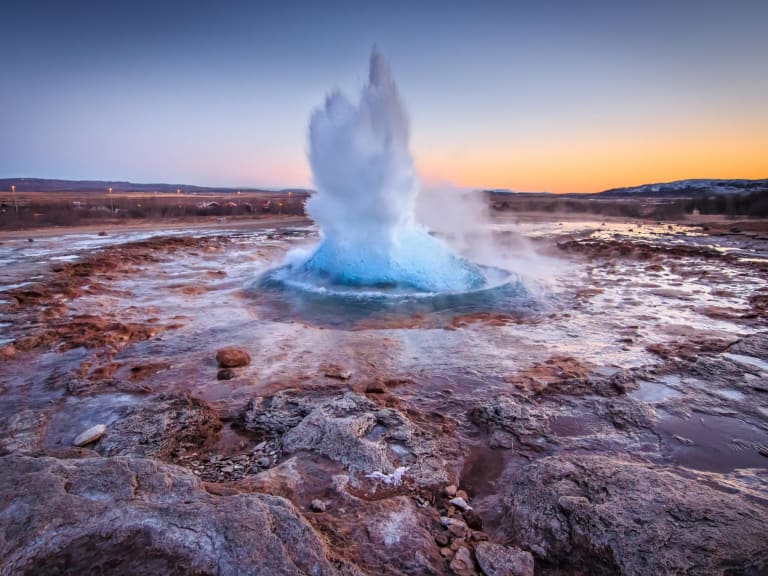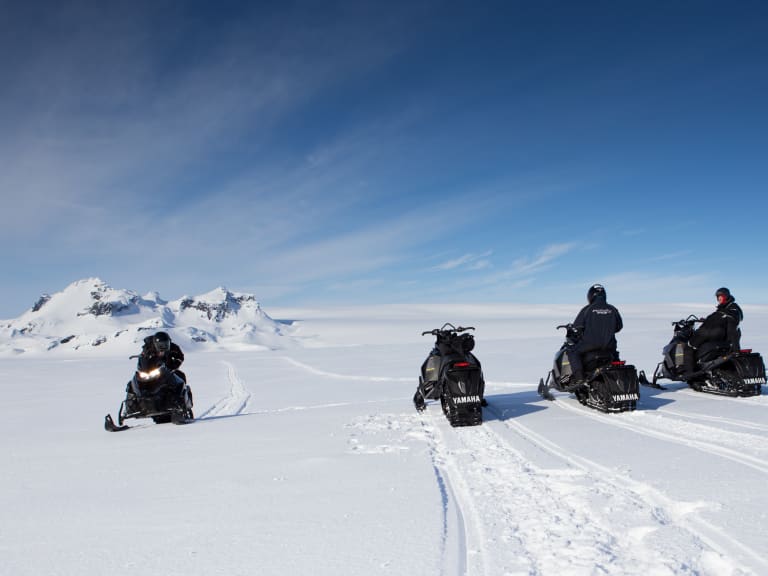Best Time to Go to Reykjavik
Reykjavik is a beautiful city, but it is also one of the most overlooked capitals in Europe. But when is the best time to visit this city? Let me tell you.

Reykjavik | © Hopp Mobility
Both in winter and summer, Reykjavik has its own particular charm and depending on the places you want to include in your itinerary of things to do in Reykjavik and the experiences you want to live, it will be better to visit in one season or another.
For example, if you want to see the Northern Lights dancing in the sky from Reykjavik, the best time to visit the city is undoubtedly winter, as well as to see the ice caves. Other activities are best left for the summer, such as the puffin cruise in Reykjavik and whale watching.
When is the best time to visit Reykjavik?

In general the best time to visit Reykjavik and all of Iceland is during the summer season, and that is because at this time of year you have access to the entire island because the roads are open and the weather is considerably warmer than during the rest of the seasons.
Being so far north, the seasons are in fact not perceived with as much difference as in other countries further south. In Iceland most of the year is considered part of the winter, and a few months as summer.
Although summer is generally the best time to visit this country, there are places and spectacles that are impossible to see during this time, for example the northern lights and the ice caves from Reykjavik that are only possible to see during the winter. But every time of the year has its charm, so it all depends on what you expect to see during your stay on the island.
A really ideal time of year to visit Iceland is during the month of September. The tenth month of the year welcomes winter, however, this does not come with force but the temperatures drop progressively until they reach their coldest point during the months of December, January and February.
This change in temperature makes September a pleasant month to visit the city. As for prices, summer will be more expensive and winter will allow you to save some money. By now you know that the high season in Reykjavik is the summer and the low season during the rest of the year.
Visiting Reykjavik during winter time

Winter is one of the best times to visit Reykjavik if you don't have problems with the cold and if you want to see spectacles such as the Northern Lights or the formation of ice caves. This season brings with it different outdoor activities that you can take advantage of in Reykjavik.
One of the interesting activities that I recommend you not to miss during your visit to the city, is skating on Lake Tjörnin. This is one of the most special places that you will find in the center of Reykjavik because it is a shallow lake that freezes in winter, leaving the largest and most fun ice rink, as well as free, throughout the capital, besides being listed by National Geographic magazine as one of the five best natural ice rinks.
One of the main advantages of visiting this city in Iceland during the winter season is the low number of tourists that you will find in the place. Since it is the off-season, tourists are scarce at this time of the year.
The scarcity of tourists also makes the tourist and accommodation offer considerably cheaper than during the summer. These are advantages that you can use to your advantage but do not rely on them. What I recommend is that, even if you intend to go during the winter season, you should make your reservations well in advance.
Despite all this, traveling to Reykjavik in winter has its cons and the main one is the weather. The weather on the island during the winter season is really hostile, with temperatures that can reach barely 0º C without recoveries higher than 1º C during the day. At night the temperature drops even more, and can even reach as low as -10ºC.
With this temperature and a much lower wind chill, it is possible to infer that you will want to think twice before venturing to Iceland during the cold winter. As for day and night, in winter in Reykjavik you will have between 4 and 5 hours of sunshine, and the rest of the daylight hours are at night. Winter in Reykjavik is between October and April.
Visiting Reykjavik during the summer

Summer arrives and with it comes the party, the heat and the day in Reykjavik. For the locals the arrival of summer is the best thing that happens during the year, that's why they dedicate multiple festivals to celebrate the arrival of this awaited season, so the offer in Reykjavik in summer, more than walks and excursions, will be music festivals and night parties.
In addition to the pleasant cultural life that Reykjavik offers during the summer season, if you are a person who prefers to travel and see different places and phenomena, then you should take advantage of doing some activities that are only done in Reykjavik in summer.
The roads to the north of the island open them during this season, so if you like hiking or even driving for many kilometers, this is an experience you won't want to miss. These hiking tours take you to idyllic places within the science fiction geography of this country.
Arriving at the island you can rent a vehicle and drive freely on these roads that during the winter were closed because of the danger they represented. In case you do not want to rent a car, you can also opt for an excursion to these places.
With summer also comes the midnight sun, the hours of sunshine increase up to 22 in one day, with only two hours of darkness, so if you are a lover of photography or painting, you will surely get inspiration in each of the landscapes where the midnight sun is the protagonist of the scene. Summer occurs from May to August.
The longer days and the nights of just two hours, will leave you the opportunity to take advantage of the day to go on excursions to different places such as the Golden Circle and take a tour of the volcanic crater of Kerid in Reykjavik.
Whale and puffin watching is another of Reykjavik's must-see activities in summer, and that is because these species come out during the summer after wintering for a long period of time.
Best time to go to Reykjavik if you want to go with children

Although Reykjavik is one of the most ignored capitals of Europe, it can be a fun place for children, although it all depends on the time of the year you go. If you go in summer season, Reykjavik can be a good option for children, because beyond festivals and concerts, there are certain family activities that you can enjoy with them.
Another advantage that the summer season has in its favor is the undoubtedly warmer weather. However, before going on an excursion or out ing anywhere in Reykjavik or outside the city, you must take into account the minimum age.
Many tours emphasize that children under certain ages are not allowed to participate in such activities for safety reasons. This is usually the case with snowmobile tours in Reykjavik or dog sledding activities.
One activity that I suggest on your family trip to Iceland and especially among the things to see and do with children, is ice skating on Lake Tjörnin, although if you want to take the little ones on a tour of some of Iceland's traditional natural attractions, I recommend taking them to the Golden Circle and the Blue Lagoon.
If you want to take them to the Golden Circle, undoubtedly one of the best times to do so is during the summer months, which you can combine with a whale watching experience or tours in Reykjavik. Children are always thrilled and excited to see animal life up close, and the latter activity is usually available for children over the age of six.
In the case of the Blue Lagoon, children over the age of two usually have access. For such young children this can be a really fun experience, while for older children it can be relaxing. This activity is ideal in both summer and winter.
Best time to go to Reykjavik if you want to see Reykjavik with few people

You will get few people in Reykjavik in winter season, especially during the months of January and February. Iceland's peak season is the summer, while tourist occupancy from September onwards starts to gradually decline.
By the end of December there tends to be considerably fewer people on the island. The capital begins to feel lonely and in many remote locations of the island only the locals are counted, which are generally very few people.
One of the biggest advantages of going to Reykjavik in winter when there are fewer people, is that you have the possibility of getting better accommodations and more attractions to visit without crowds.
I assure you that during the months of January and February you will not find anything sold out in Reykjavik. But the biggest disadvantage of going to Reykjavík during these months is that tourism starts to be a bit limited, due to the weather closing access roads to the mountainous area.
Other limitations of the winter period may be that the experiences you hire as tours and excursions to certain places, are canceled by storm or bad weather. Remember that Reykjavik has a very windy winter, so it is natural that these storms will eventually affect excursions and outings.
If you still choose November after all, because you'll find fewer people on the island, you can't miss some of the most fun winter activities, including a walk along the entire south coast of Reykjavík to visit the black sand beach of Reynisfjara. You also can't miss visiting the Blue Lagoon and of course touring the glaciers by snowmobile.
Best time to go to Reykjavík and save money

Again we analyze the feasibility of traveling to Reykjavík during the winter months, and is that, being low season not only you will find more accommodation offers and places available in different tours and getaways from Reykjavík, but you can also save a lot of money during your trip.
You will also see the difference in saving money in restaurants and souvenir stores. In summer, when there are more people on the island, prices tend to go up a bit on almost everything from accommodations to shopping, to travel experiences and even cabs to get around.
But if you still prefer to go to Reykjavik during the high season, i.e. summer, there are ways you can save money. One of the best ways to save money during your summer visit to the island is by choosing package experiences.
If, for example, you really want to see whales and at the same time you want to go to the Golden Circle, I recommend booking a combined excursion where you can do both activities for a more reasonable price. In the case of food, I would also recommend choosing tours with food included so you can save a little on that.
Best time to go to Reykjavík and save time

In case you are looking to save time on your visit to Reykjavik, this has less to do with when you go to the city and more to do with how you choose to get around the city. One of the best ways to save time on your visit to the city is to rent a car so you can get around on your own.
On the other hand, I recommend you to make all reservations, or at least most of them, before traveling and with enough time in advance. Booking online gives you the advantage of saving a lot of time and avoids unnecessary queues.
This is especially applicable if you intend to travel in summer when everything is full and you will generally find high prices in most of the attractions and tourist attractions.
